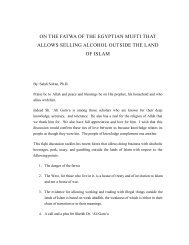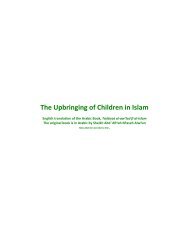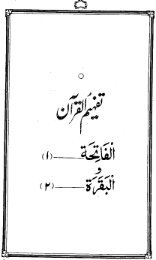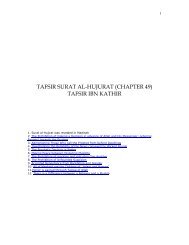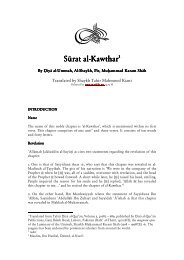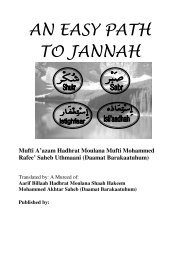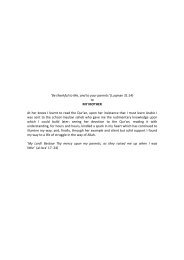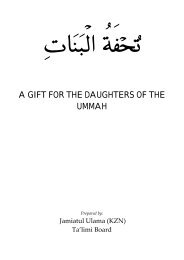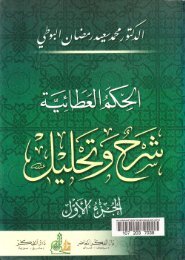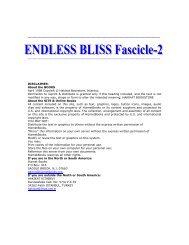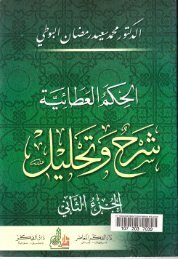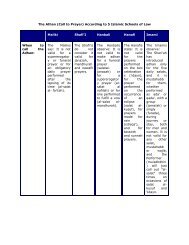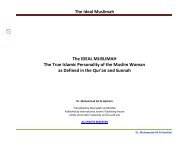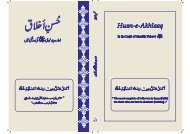Rebellion and Civil Disobedience in Islam The Need for a Paradigm ...
Rebellion and Civil Disobedience in Islam The Need for a Paradigm ...
Rebellion and Civil Disobedience in Islam The Need for a Paradigm ...
Create successful ePaper yourself
Turn your PDF publications into a flip-book with our unique Google optimized e-Paper software.
<strong>The</strong> second po<strong>in</strong>t about this Hadith is that many believe the purport of this say<strong>in</strong>g,i.e., obey<strong>in</strong>g the ruler even if one dislikes his decision, means accept<strong>in</strong>g <strong>in</strong>justice <strong>and</strong>corruption. To <strong>in</strong>vestigate this po<strong>in</strong>t, we should resort to another Prophetic say<strong>in</strong>g:“Obedience is required from the Muslim <strong>in</strong> what he likes or dislikes if he is not orderedto disobey Allah (swt). If the Muslim is ordered to do evil <strong>and</strong> disobey Allah (swt), noobedience is due.” <strong>The</strong> first part of this say<strong>in</strong>g is consistent with the purport of the firstsay<strong>in</strong>g. <strong>The</strong> second part resolves the ambiguity (see below) about how one should obeythe ruler even if he dislikes his comm<strong>and</strong>. In a third Prophetic tradition, a man was put <strong>in</strong>charge of a military expedition <strong>and</strong> the Prophet (saw) ordered the other men to obey him.<strong>The</strong> man was facetious <strong>and</strong> at a certa<strong>in</strong> po<strong>in</strong>t, he ordered a fire to be lit. He rem<strong>in</strong>ded hissoldiers that they have an obligation to obey him <strong>and</strong> ordered them to jump <strong>in</strong>to the fire.<strong>The</strong> soldiers refused to comply with this order <strong>and</strong> when the Prophet (saw) was <strong>in</strong><strong>for</strong>medof the <strong>in</strong>cident, he said: “If someone orders you to commit a s<strong>in</strong>, you should not obey.Obedience is due only <strong>in</strong> what is just <strong>and</strong> good.” No obedience is owed to a created if itentails disobey<strong>in</strong>g the Creator (swt).Now comb<strong>in</strong><strong>in</strong>g the three aHadith, it is clear that what one dislikes is someth<strong>in</strong>g verydifferent from accept<strong>in</strong>g <strong>in</strong>justice which blatantly contravenes the basic pr<strong>in</strong>ciples of<strong>Islam</strong> as mentioned <strong>in</strong> the Quran <strong>and</strong> the Sunnah. It is well known that many issues <strong>in</strong><strong>Islam</strong>ic jurisprudence have different solutions predicated on different plausible<strong>in</strong>terpretations 18 . <strong>The</strong> reason <strong>for</strong> this is that the <strong>Islam</strong>ic textual sources can be ofspeculative or def<strong>in</strong>itive authenticity <strong>and</strong> can have speculative or def<strong>in</strong>itive mean<strong>in</strong>gs.Texts that have def<strong>in</strong>itive authenticity <strong>and</strong> mean<strong>in</strong>g comprise the immutable tenets <strong>and</strong>pr<strong>in</strong>ciples of <strong>Islam</strong>. Apart from these constants, scholars disagree over other issuesdepend<strong>in</strong>g on many factors. It is these disputable issues that the Prophet (saw) meantwhen he talked about obey<strong>in</strong>g the ruler, the leader, or the government even if the Muslimdislikes the rul<strong>in</strong>g.This issue is complicated. It is related to the question of how an <strong>Islam</strong>ic state shoulddeal with the different plausible <strong>in</strong>terpretations. Does the <strong>Islam</strong>ic state have theprerogative to impose a certa<strong>in</strong> <strong>in</strong>terpretation of <strong>Islam</strong>ic Shari‘ah while exclud<strong>in</strong>g other<strong>in</strong>terpretations? If the answer is sought with<strong>in</strong> the conf<strong>in</strong>es of <strong>Islam</strong>ic Shari‘ah, thenseveral pr<strong>in</strong>ciples must be taken <strong>in</strong>to account. For example, (a) the a<strong>for</strong>ementionedpr<strong>in</strong>ciple of <strong>in</strong>dividual responsibility which implies that follow<strong>in</strong>g a jurist, a council ofjurists, or a specific school of jurisprudence does not absolve the Muslim of his<strong>in</strong>dividual accountability be<strong>for</strong>e Allah (swt). (b) <strong>The</strong> need <strong>for</strong> unity, order, <strong>and</strong> stability.(c) <strong>The</strong> balance between the <strong>in</strong>terests of the <strong>in</strong>dividual <strong>and</strong> the <strong>in</strong>terests of the society.<strong>The</strong> answer should be based on strik<strong>in</strong>g a balance between these compet<strong>in</strong>g pr<strong>in</strong>ciples.Also it seems that the answer should be context dependent. For example, contrast theissue of identity cards with photographs with the issue of organ donation. Assume that an18 <strong>The</strong> question of the plausibility of a certa<strong>in</strong> <strong>in</strong>terpretation is very important to answer. In general, twonecessary conditions <strong>for</strong> a plausible <strong>in</strong>terpretation are (a) be<strong>in</strong>g consistent with the rules of Arabiclanguage, <strong>and</strong> (b) be<strong>in</strong>g consistent with the def<strong>in</strong>itives of the Quran <strong>and</strong> the Sunnah---the pr<strong>in</strong>ciples <strong>and</strong>rules mentioned <strong>in</strong> the Quran <strong>and</strong> the authentic Sunnah <strong>in</strong> a self-evident language upon which no twopersons of sound <strong>in</strong>tellect <strong>and</strong> proper underst<strong>and</strong><strong>in</strong>g on the Arabic language could disagree.9



